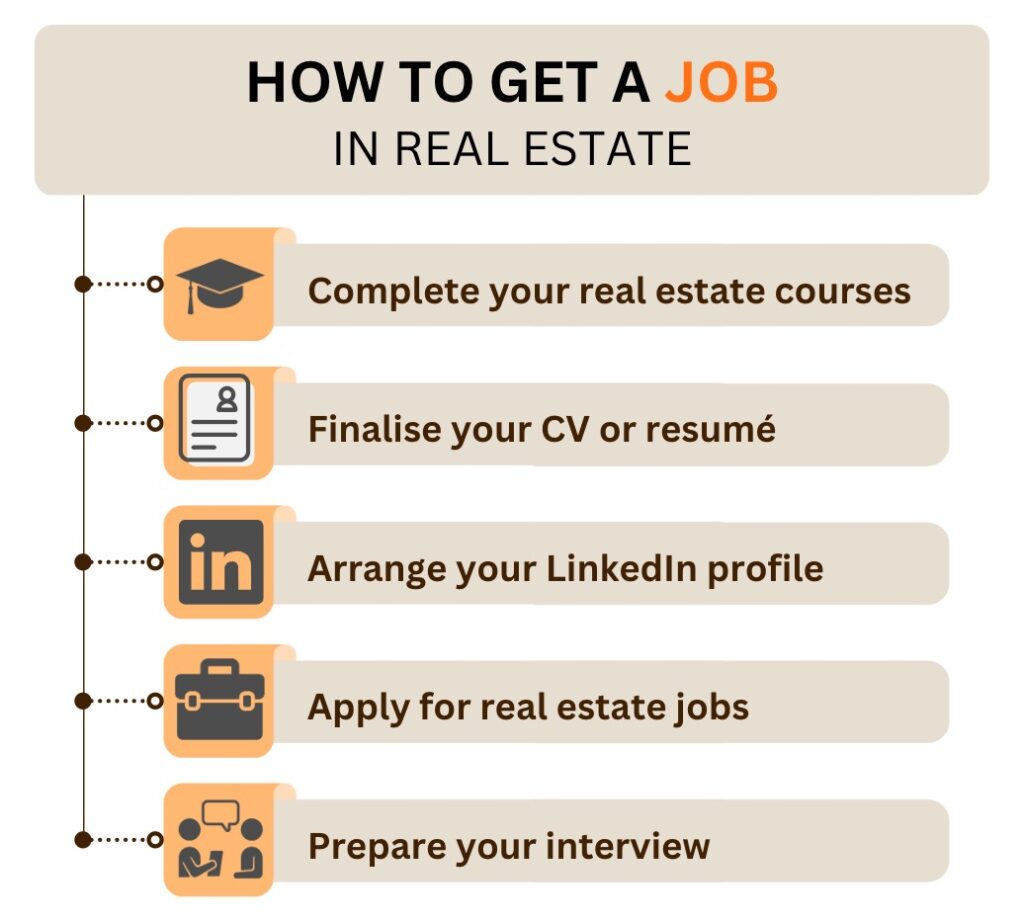If you’re wondering how to get a job in real estate, keep reading because we have a step-by-step guide to help you find one.
The real estate industry can be intimidating when you’re first looking for a job – there are so many brands, personalities, and fierce competition. However, there are ways in which you can get ahead, get noticed, and find your dream position.
How to get a job in real estate in 4 steps
The first thing you’ll need to do is choose a real estate course that matches your career goals. One that offers the course you need to apply for the qualification you want.
Keep in mind that every Australian state and territory has its own particular rules for regulating the real estate industry. That means you’ll have to choose a course that’s valid in the state or territory in which you live and work.
The most important things to check when you’re selecting a real estate course provider are to:
- go to their website and read the student reviews. Also search online for the institute and see if they have a lot of Google reviews
- select a course provider with a long trajectory in the market with a Registered Training Organisation (RTO)
- check they have good after-hours support. This is essential if you’re working 9–5 and studying out-of-office hours
- make sure the course provider has a good online platform and user-friendly technology
- ensure the course fees are affordable and offer value for money.
1. Prepare your CV
After you complete your real estate course, you’ll need a CV. One of the most important things you’ll need to show a potential employer is your ability to develop and maintain good relationships with people and in positions. But, if you’re a newbie, you won’t be able to demonstrate this skill yet. So what do you do?
You can still make a lasting impression. Have you worked in another role where you dealt with customers, where your success depended on serving or selling goods to customers?
For all of us, there’s something in our past experience that we can use to show we’re good communicators and, importantly, that we enjoy working with people. Make sure you add this to your CV and resume.
How to get a job in real estate is sounding easier already, isn’t it?
Here’s how to prepare your winning CV:
- Look online for free and paid CV templates. Make sure the one you choose has a clear and straightforward design. Let your words do the work not a fancy unrelated design.
- There’s no need to add your age or religion to your CV.
- Add a photo if you want. Real estate agents like portrait photos and are accustomed to seeing them. If you prefer not to, then that’s fine too.
- Keep your CV short and concise. Make sure it’s no larger than two pages.
- Add references from former employers, if you can. Here’s your chance to show that you’ve worked with people and enjoyed it.
- When you write about former jobs, use real estate terms such as communication skills, negotiation skills and capital gains. Read more about how to get a job in real estate with no experience.
2. Prepare your LinkedIn profile
LinkedIn has become a powerful platform for job hunters. It is also a good place to network with like-minded people and demonstrate that you know how to get a job in real estate.
Make sure you comment on other people’s posts, but keep it professional and focused on business. Be aware that any comment you post on someone else’s profile is also displayed on your own page as your latest ‘Activity’.
There are two types of LinkedIn accounts: free and Premium. The free account is excellent and provides many useful functions.
To create a professional LinkedIn profile, you need to:
- copy your CV onto your profile
- search for former colleagues and managers and send them a request to endorse your skills or even write you a recommendation
- change your status to ‘Open for work or opportunities’
- upload a nice photo of yourself
- check the privacy settings on your account so that you’ll be notified if another LinkedIn member looks at your profile.
3. Apply for jobs online
After completing your real estate course, creating a CV and opening a LinkedIn account, you’re a lot more informed about how to get a job in real estate.
It’s time to actively seek work, and free posting boards like realestatecareers.jobs is a good place to start. It’s a free job board that’s dedicated to real estate agent job vacancies across Australia.
You can also subscribe so that you’re alerted when jobs are posted. Be ready to apply promptly for jobs as they are advertised by:
- preparing a cover letter pointing out your desire to work and the skills you have
- having a cover letter template to modify and tailor for each job you apply for.
4. Get ready for the interview
So, you got an interview! But what should you do now?
Start with some reading so you know what to expect in the interview. Anticipating the questions you’ll be asked will make you less nervous and well prepared.
- To get a head start, read The top 10 questions recruiters ask when interviewing real estate agents.
- Dress up to impress. Real estate agents are always well-dressed so be sure to wear business clothes.
We hope this guide has helped you learn more about how to get a job in real estate.
Why we’re up there with Australia’s best
Entry Education is one of Australia’s leading real estate academies. We built our business from the ground up and our success is due to our authentic approach to quality content and delivering the best learning experiences possible to our real estate students.
When students leave reviews for Entry Education, they usually talk about the support they received throughout their course. They loved that student support was available both in and out of office hours, and that on the weekends or at night, they could message their tutor for assistance.
What is Entry Recruiting?
Both Entry Education and Entry Recruitment are part of the Entry Group of companies. Entry Recruitment is a Melbourne-based real estate recruitment company that’s built a state-wide network of high-level property professionals. They thrive on finding the best candidates for agencies seeking new team members.
If you’re Melbourne-based, contact Entry Recruitment today. It’s free for job seekers!
Don’t forget the free Australia-wide job board, realestatecareers.jobs, provided by the Entry Group for agents seeking work in the real estate industry. It’s a hotspot for both agencies and job seekers!





















